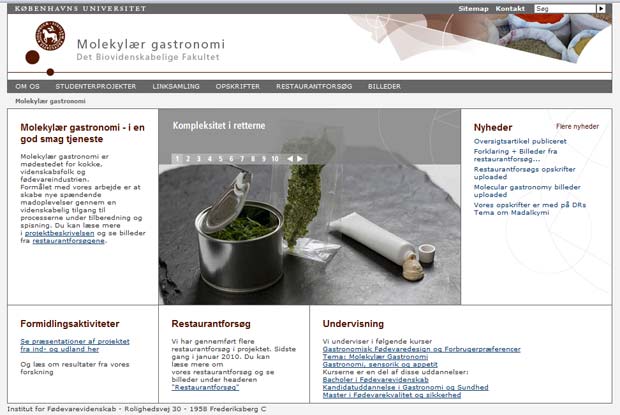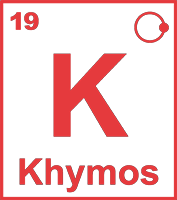
Homepage of the molecular gastronomy project at the University of Copenhagen (sorry – only in Danish as far as I know)
The research project Molecular gastronomy – the scientific study of deliciousness and its physical and chemical basis (Danish homepage) funded by The Danish Research Council was started in 2006. Led by prof. Leif Skibsted people from the Food Chemistry (Jens Risbo, Pia Snitkær Nielsen, Louise Mørch Mortensen) as well as the Sensory Science group (Michael Bom Frøst, Wender Bredie, Per Møller, Line Holler Mielby, Ditte Hartvig) at the Department of Food Science at Copenhagen University have been involved. In addition gastronomic entrepeneur Claus Meyer (noma co-founder) and physics professor Peter Barham (Bristol University) have contributed, as well as the chefs Thorsten Vildgaard (noma/Nordic Food Lab) and Bo Frederiksen (Meyers Madhus). Any of the names sound familiar? They should if you’ve read the recent review published in Chemical Reviews: Molecular Gastronomy: A New Emerging Scientific Discipline where several of the people involved in the project contributed as authors. This landmark paper summarizes and lays out research opportunities in molecular gastronomy, the branch of food science that deals with The art and science of choosing, preparing and eating good food to quote Thorvald Pedersens definition – he is a professor emeritus in chemistry that played an important role helping to establish molecular gastronomy as a research field at the University of Copenhagen.
To mark the end of the project a seminar was organized on March 2nd 2011. The program included the following presentations:
- Reduction of meat stock, what happens? (PhD Pia Snitkjær)
- Flavour pairing (Professor Wender Bredie)
- Chocolate desserts or the importance of phase inversion (PhD student Louise M. Mortensen)
- What’s in a meal? (Associate Professor Michael Bom Frøst)
- Molecular Gastronomy meets the internet (Chemist and food blogger Martin Lersch)
- Molecular Gastronomy – a tool for teaching science (Associate Professor Jens Risbo)
- Food: making science engagement easy (Professor Peter Barham, Bristol University)
As an intermezzo in the program “˜Gastronomisk legestue’ (Gastronomic playroom) presented examples of recent edible works. They are a group of students and young chefs that use the gastronomy teaching lab of the Department of Food Science for gastronomic explorations. I’m very happy I had the opportunity to be present. It was a very interesting day and I will try to share some impressions with you, so expect blog posts about the seminar and the presentations in the next couple of days. As you can see from the program I was also asked to give a presentation which I will come back to here on the blog in a separate post.
I quote the following from the invitation to the seminar about the purpose of the project:
During the four-year project period we have worked on obtaining a deeper understanding of relationships between products‘ physical/chemical characteristics, processes during preparation, and perception of good food. Through experiments in the laboratory, the kitchen, the sensory test room and the restaurant the project has increased the understanding of factors contributing to appreciation of a meal, all the way from choosing the ingredients through preparation to serving and introducing the meal at the dinner table.
An important outcome of the project is the large review of the field: Molecular Gastronomy – a new emerging scientific discipline, which was published in Chemical Reviews in 2010. As a service to the gastronomic society, it can freely be downloaded here.
The goal of the project has been to support inspiration for better foods from gastronomy to science and from science to gastronomy. We strongly believe that working across disciplines, integrating know-how of chefs with the chemical/physical and perceptual/cognitive understanding of food, will contribute to better foods in the future. We believe that our work and future work in this field are important to a positive development of the food sector and our food culture.

Interesting. Did Jens Risbo refer to any published literature on his presentation?